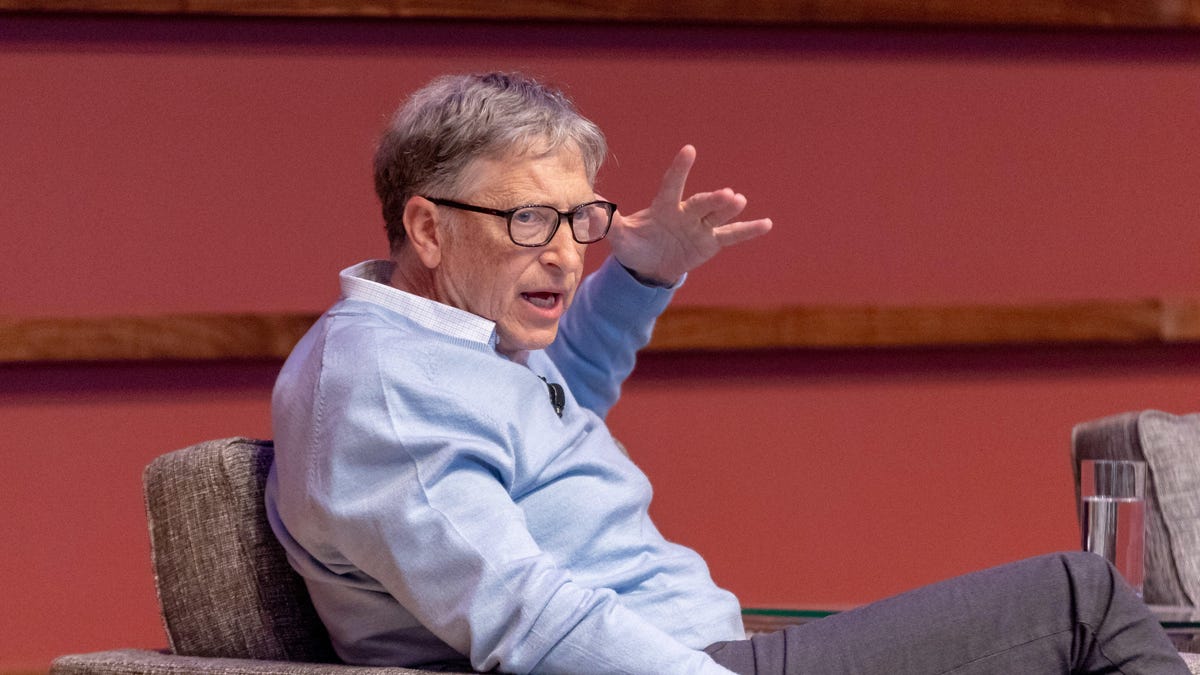Bill Gates says AI should improve education and medicine
Artificial intelligence is "both promising and dangerous," like nuclear weapons and nuclear energy, Microsoft's co-founder says.

Bill Gates speaks at Stanford's Human-Centered AI conference.
Artificial intelligence is an unusual technology with the potential to both harm and help us, Microsoft co-founder and now philanthropist Bill Gates urged. So to ensure it's a boon, we should put AI to work improving health and education.
"The world hasn't had that many technologies that are both promising and dangerous," Gates said Monday, mentioning nuclear energy and nuclear weapons as other examples with that much potential for profound change. As for areas where AI has helped society so far, he said, "I won't say there are that many."
But that doesn't have to be the case. He singled out medicine and education as areas where AI could help out the humans while speaking at a conference run by the new Stanford Institute for Human-Centered Artificial Intelligence.
"It's a chance to supercharge the social sciences, with the biggest being education itself," Gates said of AI's promise. Gates, for years, has expressed worries about the risks of AI technology.
AI, boosted by the new utility of technology called neural networks that are based loosely on the way human brains work, has revolutionized the technology industry. It's used for everything from facial recognition to scouring spam out of email inboxes. Gates wants more than just tech giants like Amazon, Google and Facebook to benefit, though.
More selenium, fewer premature births
As one example, he said, AI has been used to pore through 23andMe genetic data to discover that a shortage of the element selenium could be associated with premature births in Africa. In 18 months, we should find out whether the resulting program to give 20,000 women more will help.
"We expect to see about 15 percent reduction in prematurity, which for Africa as a whole would project out to be about 80,000 lives saved per year," Gates said.
For education, he hopes AI will let us find what works in schools and reproduce that elsewhere. "We have not even begun to do that work of understanding motivation and engagement and teaching styles that would really improve the output of the system -- better learning, less dropouts," Gates said.
Gates grew rich from technology as his company's software -- namely Microsoft Windows and Office -- spread across the globe. He's since shifted to philanthropic efforts, perhaps most notably an effort reduce deaths from malaria.
Among other comments:
- The US has lost its technological edge over other countries, Gates said: "The US was in this totally unique position for most of these breakthrough technologies. Now the US is still very much the leader, but not in a the same dominant, dominant way." A decade from now it may not be researchers in the US who figure out how best to create an AI that reads scientific research papers to discover biological advances, he said.
- The inner workings of today's AI systems are too inscrutable. "It is troubling that today's deep learning systems are mostly opaque," Gates said. He hopes somebody will improve their "explainability" without degrading their performance.
- "The profound societal changes from personal computing are just beginning," Gates said, with society now grasping the magnitude of problems stemming from social networks. When he was at Microsoft, "There wasn't a recognition that that kind of freedom would have these pretty dramatic effects that we're just beginning to debate today."
- In his days at Microsoft, there was worry that PCs would broaden the "digital divide" of economic opportunity between wealthy and poor people, for example by giving students well-funded schools access to PCs. But, he said that in education so far, "The value of personal computers is essentially nil," drawing a laugh from the audience. "So that's good. We didn't create this digital divide."

